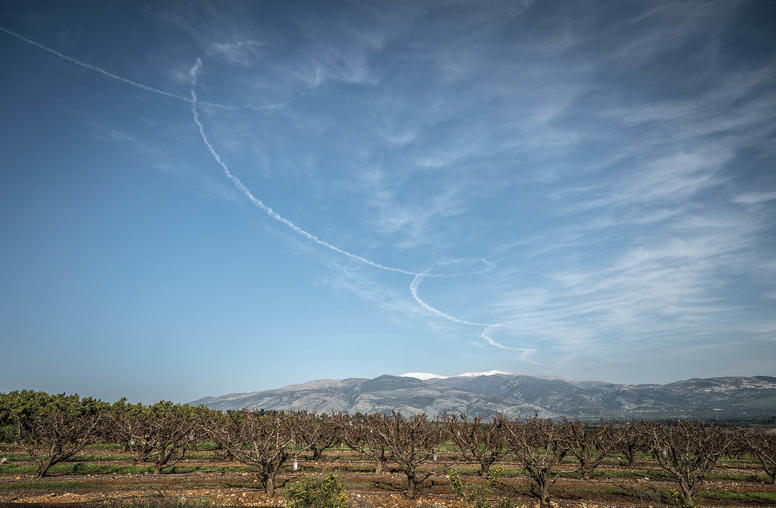Panel Urges New View of Middle East Refugees
Displaced People Can Become Economic Engine, Working Group Says
The refugee crisis that has spread to Europe and the breakdown of the Middle East’s century-old political order demand new thinking about the economic role of displaced people and a reassessment of donor strategies to rebuild societies in conflict, a working group convened by the U.S. Institute of Peace concluded. The panel’s report, developed under USIP’s Manal Omar and Elie Abouaoun as part of Atlantic Council’s Middle East Strategy Task Force, calls for refugees to be viewed as potential economic contributors to host countries rather than financial burdens.

The report also argues that the international community must respond to social breakdown in a holistic way, rather than addressing crises as if conflict takes place in a linear progression. Concrete suggestions for new approaches range from market research on the refugee economy to early dialogue between host communities and the displaced people among them.
The idea that refugees should be seen as an economic opportunity is a “powerful and intriguing counter to the prevailing public narrative.” – Madeleine Albright and Stephen J. Hadley
The efforts of the USIP-convened working group will inform a final report by the Atlantic Council task force, co-chaired by former Secretary of State Madeleine Albright and USIP Chairman and former U.S. National Security Advisor Stephen J. Hadley. USIP President Nancy Lindborg is a senior advisor to the task force.
The idea that refugees should be seen as an economic opportunity is a "powerful and intriguing counter to the prevailing public narrative," Hadley and Albright wrote in a forward to the working group conclusions.
In addition to Omar, who is USIP's associate vice president for the Middle East and Africa, and Abouaoun, the director of Middle East programs, the working group included institute scholars and program officials such as North Africa Director Linda Bishai and Georgia Holmer, the director for countering violent extremism. The panel's members also included civil society leaders from the Middle East who work with USIP to successfully negotiate community-level reconciliation agreements.
The Middle East Strategy Task Force was established in February 2015 to examine the underlying issues of state failure and political legitimacy that drive extremist violence in the Middle East and to help develop a long-term framework for U.S. policy in the region. Its five working groups, assembled by experts or organizations that include the Brookings Institution, look at economic recovery; politics and governance; religion, identity and countering violent extremism; security; and USIP's contribution, "Rebuilding Societies: Refugees, Recovery and Reconciliation."
'Fueling More Violence'
The 38-page USIP-led report, written under lead author Béatrice Pouligny, concludes that the international community responds to crises of conflict and displacement in ways that "are not only frequently inefficient and unsustainable; they also run the risk of producing further fragmentation of local societies and fueling more violence."
The conclusions outline five key principals as guidelines for aid that can set the stage for long-term peacebuilding:
- Better integrating the cross-border dimensions of crises for all programming.
- Designing multifaceted interventions that simultaneously, rather than sequentially, address the causes and outcomes of conflicts.
- Focusing on sustainable aid.
- Drawing local people into efforts to revitalize their communities.
- Working to create conditions for social peace in the future.
Three main tools can be used to consider new ways for host communities and displaced people to work together on economic development, according to the report. Market research could map economic networks in areas with dense populations of refugees. That could uncover outlets for goods produced by currently idle refugees and, combined with attention to work authorization issues, help them fill gaps in the local workforce.
Supporting dialogue between refugees and host communities can reveal mutual needs that open opportunities, particularly if agreed-upon projects generate financial support from aid donors. Finally, the projects must be jointly monitored to ensure they continue to be mutually beneficial, according to the report.
While the paper's conclusions were informed by the working group debates, they represent Omar's individual findings in her capacity as convener and don't necessarily reflect the views of each member of the working group or the larger task force.
Seeds of the Future
Among areas of agreement cited by Hadley and Albright were the report's warning against "sequencing" of crisis response by, for example, having diverse organizations first deal with food needs, then shelter, then community frictions.
"The seeds for the future of conflict-torn societies must be planted even before the fighting has stopped," they wrote.
The paper supports an intensified shift toward "resilience-based interventions" that combine humanitarian relief with development approaches from the outset—a peacebuilding strategy that has yet to take hold in most international aid programs. Resilience projects, which help communities and refugees recover from conflict and displacement and resist shocks in the future, remain underfunded and outside the mainstream, impeded as well by the top-down nature of United Nations assistance and the failure of squabbling organizations to fully engage with people on the local level, the study found.
"Supporting people's resilience now is not only a sound political strategy," according to the report. "It is a good economic investment that may save taxpayer money in the future, while planting the seeds for long-term peace and stability."



